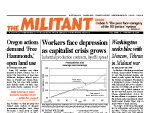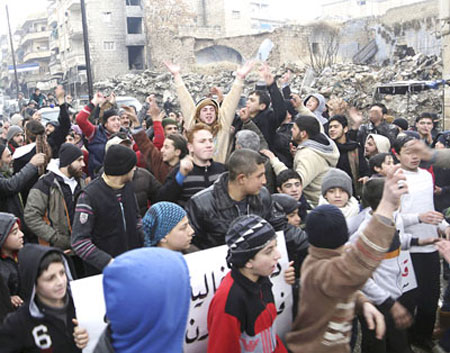“In today’s world we’re threatened less by evil empires and more by failing states,” Obama said in his Jan. 12 State of the Union talk. “The Middle East is going through a transformation that will play out for a generation.”
“And the international system we built after World War II is now struggling to keep pace with this new reality,” he said, pointing to the need to “help remake that system.”
Obama’s nuclear deal with Tehran last year was a key stepping stone toward creation of the new alliance. And, in recent talks with officials in Moscow, Secretary of State John Kerry has made it clear that a cease-fire in Syria has to be put in place, even if it means that Bashar al-Assad, that country’s bloody dictator, remains president.
Paris, Berlin and other European Union rulers are pressing Obama in this direction and the United Nations has set Jan. 25 for a conference on Syria’s future. But clashes between Iran and Saudi Arabia, Turkey and Russia, discrimination by Iraq’s Shia-led rulers against the country’s large Sunni population, and the brutal war by Ankara against Kurds pose real obstacles.
After two small U.S. Navy boats strayed into Iranian territorial waters Jan. 12, authorities there first seized and then released the 10 sailors and their vessels. Tehran’s action “hailed as a sign of warmer relations,” the New York Times wrote the next day.
Washington balks at introducing larger levies of ground forces, but is stepping up use of its military might. Obama pointed proudly to U.S. warplanes “nearly 10,000 airstrikes” in Iraq and Syria and said the fight against terrorism will mean more.
Competition between Iran’s Shia-led government and Saudi Arabia’s Sunni monarchy for domination of the region — already evidenced in the proxy war in Yemen — became sharper after Riyadh executed 47 Sunni and Shia opponents of the government, including Sheikh Nimr al-Nimr, a cleric outspoken in defense of Saudi Arabia’s oppressed Shia minority. After demonstrations against Saudi Arabia took place in Iran, Riyadh cut off diplomatic relations and called emergency meetings of the Gulf Cooperation Council, an association of Gulf monarchies, and the Arab League to condemn Tehran.
Islamic State, a merger of former al-Qaeda terrorists and officers of Saddam Hussein’s Iraqi army — forces who met in prison after Washington invaded and disbanded Iraq’s military — is a reactionary gang of thugs and bigots. It has seized territory in Iraq and Syria, brutalizing local populations, filling a political vacuum left by decades of betrayals by Stalinist parties and bourgeois nationalist forces of struggles by workers and farmers for independence.
Washington praised the recent success by Iraqi forces in driving Islamic State out of most of Ramadi. But in fact the operation was carried out by a 500-member elite U.S.-trained counterterrorism force backed by more than 600 airstrikes by the U.S. government and its allies. Regular Iraqi army troops, who fell apart and fled when IS took control of Mosul and Ramadi a year earlier, played little role. The bombings, combined with mines placed by retreating Islamic State forces, left the city in ruins and its population displaced. Islamic State still occupies the area east of the city.
Retaking Islamic State’s stronghold in Mosul, a city four times the size of Ramadi, would require either significant Kurdish fighters, new U.S. forces or a transformation of the Iraqi regular army.
Assad advances in south
In Syria Assad, backed by Tehran’s ground troops and Moscow’s bombs, has gained strength. Assad’s troops pushed into southern Syria, a stronghold of opposition forces supported by Sunni governments in the region and Washington.The battle is centered near the Golan Heights, the region occupied by Israel since 1967, where a large deposit of petroleum has recently been discovered. While Russian President Vladimir Putin assured Israeli Prime Minister Benjamin Netanyahu in September that Iran and its proxy Lebanese Hezbollah militia would stay away from the Golan Heights, Hezbollah troops are part of the forces moving into the south.
Assad’s forces have imposed a brutal starvation siege against Madaya, on Damascus’ outskirts, cutting food shipments for the 20,000 residents there since October, leading to the deaths of at least 23 people.
In the face of worldwide outrage, government forces allowed relief organizations to deliver food to the town in mid-January.
Nearly 400,000 Syrians live in areas under siege.
Attacks on Muslims, political rights
Washington, Paris, Brussels and other imperialist powers continue to whip up fear of Islamic State terrorism at home, amidst attacks against Muslims and mosques, laying the basis for closing political space for the working class as a whole.The U.S. House of Representatives, with overwhelming bipartisan support, passed legislation Dec. 8 to restrict its visa waiver program for 38 countries. The law, if passed by the Senate, will require any foreign national who has visited Iraq, Iran, Syria or the Sudan in the past five years to obtain a visa before entering the U.S.
In Germany, Chancellor Angela Merkel has backtracked from calls for unlimited immigration after attacks on women outside a Cologne railway station, in the midst of revelry on New Year’s Eve by groups that included young North African and Middle Eastern men. More than 500 complaints have been filed, 40 percent for various sexual offenses, including two charges of rape. There were reports of similar attacks in Helsinki.
Widespread publicity and scare-mongering around the attacks have strengthened moves in Europe to restrict the entry of refugees from Syria and elsewhere and fueled physical attacks by rightists. In Cologne six people of Pakistani origin were attacked Jan. 10 by a group of about 20 people, and a Syrian-born man was beaten in a separate attack.
The Council on American-Islamic Relations in the U.S. continues to report a step-up in threats and assaults on Muslims and mosques here. In Dallas, Anthony Paz Torres visited Omar’s Tire Shop and asked if Omar was Muslim, which he is, CAIR reported Jan. 9. Paz threatened to return and kill people.
He returned two weeks later on Christmas Eve, opening fire and killing one person and critically injuring another while he shouted “Muslim,” CAIR reported.
Related articles:
Socialist Workers Party backs defense of Somali meatpackers
|
Printer-friendly version of this article |







 a magazine of Marxist politics and theory from 1934 to the present
a magazine of Marxist politics and theory from 1934 to the present issues of the monthly Spanish-language socialist magazine from 1999 to 2005
issues of the monthly Spanish-language socialist magazine from 1999 to 2005




